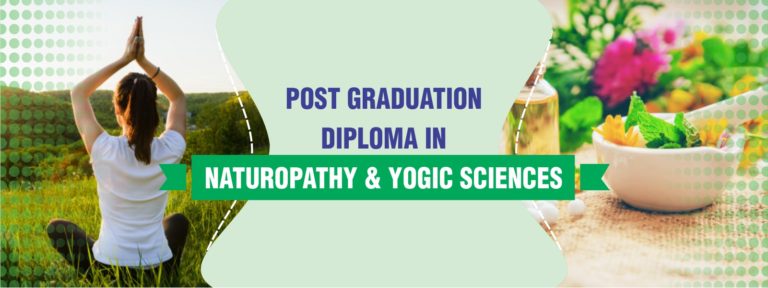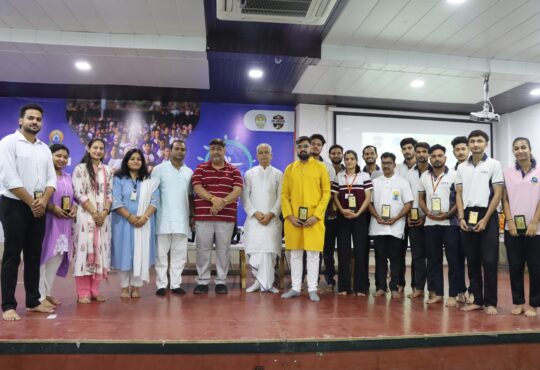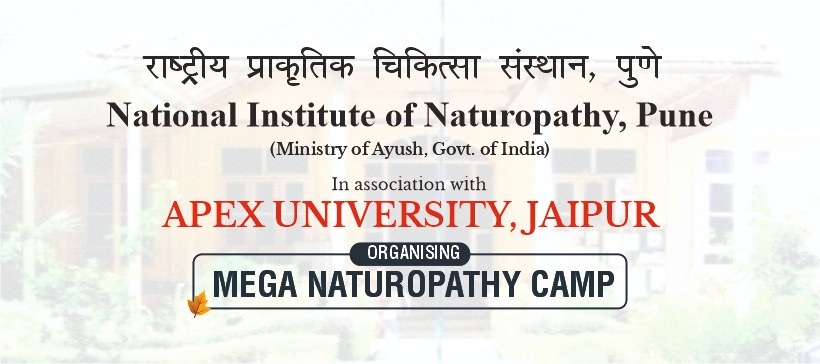
BNYS Academic Information
BNYS SYLLABUS
Five and half years’ Undergraduate Medical Degree in Yoga and Naturopathy 2019-20
CONTENTS
Introduction
Section I : Goals of BNYS Course
Section II : Objectives of Medical Graduate Training Programme
Section III : Course of study, Attendance and Scheme of examination including Distribution of Marks of Clinical Course
Section IV : Subjects and Course Contents
i) Anatomy
ii) Physiology
iii) Biochemistry
iv) Philosophy of Naturopathy
v) Principles of Yoga
vi) Sanskrit
vii) Pathology
viii) Microbiology
ix) Community Medicine
x) Yoga Philosophy
xi) Basic Pharmacology
xii) Colour therapy and Magneto biology
xiii) Forensic Medicine and Toxicology
xiv) Manipulative Therapies
xv) Acupuncture and Acupressure
xvi) Yoga and its applications
xvii) Nutrition and Medicinal Herbs
xviii) Diagnostic Methods (I and II) Naturopathy and Conventional Medicine
xix) Psychology and Basic Psychiatry
xx) Fasting therapy and Dietetics
xxi) Obstetrics and Gynecology
xxii) Yoga therapy
xxiii) Hydrotherapy and Mud therapy
xxiv) Physical Medicine and Rehabilitation
xxv) First Aid and Emergency Medicine
xxvi) Clinical Naturopathy
xxvii) Research Methodology and Recent Advances
Section V : Teaching of Medical Ethics in BNYS Course
Annexure I : Different Methods Recommended for Internal Assessment
Annexure II : A comprehensive list of skills for a BNYS Graduate
INTRODUCTION
First year BNYS is of 1½ year duration, and consists of pre-clinical subjects and subjects describing Yoga and Naturopathy principles, Anatomy, Physiology, Biochemistry, Philosophy of Naturopathy, Principles of Yoga and Sanskrit.
Second year BNYS is of 1 year duration, and consists of Para-clinical subjects and subjects describing philosophies of Yoga and Naturopathy clinical subjects, Pathology, Microbiology, Community Medicine, Yoga Philosophy, Basic Pharmacology, and Colour therapy and magneto biology.
Third year BNYS is of 1 year duration, and consists of Para-clinical subjects and Yoga and Naturopathy clinical subjects, Forensic Medicine and Toxicology, Manipulative Therapies, Acupuncture and Acupressure, Yoga and its applications, Nutrition and Medicinal Herbs, Diagnostic Methods (I and II) Naturopathy and Conventional Medicine, Psychology and Basic Psychiatry, and Fasting therapy and Dietetics.
Final year BNYS is of 1 year duration, and consists of clinical subjects and Yoga and Naturopathy clinical subjects Obstetrics and Gynecology, Yoga therapy, Hydrotherapy and Mud therapy, Physical
Medicine and Rehabilitation, First Aid and Emergency Medicine, Clinical Naturopathy and Research Methodology and Recent Advances. In Section I, goals of BNYS course are given. Section II gives general objectives.
Section III gives duration of the course, recommendations regarding attendance, internal assessment, distribution of marks for various subjects in professional examinations and criteria for pass.
Revised course contents, subjects like Pharmacology, Forensic Medicine and Toxicology, Sanskrit, Principles of Yoga, Herbology, Clinical Naturopathy, Psychology and Basic Psychiatry, Clinical Naturopathy, Research Methodology and Recent Advances are added in this publication – are elaborated in Section IV. Section V deals with topics recommended for teaching of medical ethics.
SECTION I
1 Goals of BNYS Course
1.1 Recognize the health needs of the community, and carry out professional obligations ethically and in keeping with the objectives of the national health policy; 1.2 Develop the skills in most of the competencies, and training that are required to deliver the Naturopathy and Yoga health care system; 1.3 Become aware of the contemporary advances and developments in the discipline concerned; 1.4 Acquire a spirit of scientific inquiry and is oriented to the principles of research methodology and epidemiology; 1.5 Become proficient in their profession by developing scientific temper and improve educational experience; 1.6 Identify social, economic, environmental, biological and emotional determinants of health in a given case and take them into account while planning therapeutic, rehabilitative, preventive and promotive measures/strategies; 1.7 Plan and devise measures in Naturopathy and yoga for the prevention and rehabilitation of patients suffering from disease and disability ; 1.8 Demonstrate skills in documentation of individual case details as well as morbidity data relevant to the assigned situation; 1.9 Demonstrate empathy and humane approach towards patients and their families and exhibit interpersonal behavior in accordance with the societal norms and expectations;
1.10 Play the assigned role in the implementation of national health programs, effectively and responsibly; 1.11 Organize and supervise the chosen/assigned health care services Demonstrating adequate managerial skills in the clinic/hospital or the field Situation; 1.12 Develop skills as a self-directed learner; recognize continuing educational needs, select and use appropriate learning resources; 1.13 Demonstrate competence in basic concepts of research methodology and epidemiology, and be able to critically analyze relevant published research literature; 1.14 To implement all National health policies ;
1.15 Work towards realization of ‗Health for all‘, as a national goal through naturopathy and yoga; 1.16 To follow the medical ethics and to fulfill the social and professional responsibilities as a Naturopathy and Yoga Physician through drugless therapies; 1.17 Be competent in the practice of holistic medicine with expert knowledge and experience in promotive, preventive, curative and rehabilitative aspects of diseases; 1.18 Become proficient in their profession by developing scientific temper and improve educational experience;
2 Institutional Goals
After the medical undergraduate program, the students must:
2.1 Be able to expertly diagnose and manage common diseases and health problems of individuals as well as community, work with the health team as a fully qualified doctor at primary, secondary or tertiary levels, with his/her clinical experience and skills in history, physical examination and relevant investigations; 2.2 Be proficient in promotive, preventive, curative and rehabilitative medicine and therapy for common health issues; 2.3 Be adept in different therapeutic modalities and their administration;
2.4 Develop a humane attitude towards one‘s clients and understand economic, environmental, social, psychological and cultural factors that influence health; 2.5 Enjoy an urge for self-improvement, directed towards advanced expertise or research in any chosen area of health care; 2.6 Have enough knowledge about implementation of National Health Programs and the basic factors required for the same, which are as follows; 2.6.3 Family Welfare and Maternal and Child Health (MCH);
2.6.4 Sanitation and Water Supply;
2.6.5 Prevention and Control of communicable and non-communicable diseases; 2.6.6 Immunization;
2.6.7 Health education;
2.7 Possess management skills in human resources, materials and resource management in health care delivery;
2.8 Be competent in recognizing community health issues and design, institute curative and preventive measures and evaluate the outcome of these measures, thus working towards resolving these issues; 2.9 Be able to work successfully in a variety of health care settings;
2.10 Develop integrity, responsibility, reliability, dependability and compassion, which are characteristics required for successful professional life; 2.11 Develop leadership and communication skills to work as leading investigator or clinician in health care teams;
SECTION II
- Objectives of Medical Graduate Training Programme
1.1. To effectively integrate the conventional basic sciences
(e.g. human physiology) with the traditional medical systems and to enhance the understanding of their effects and therapeutic potential; 1.2 To provide state of the art learning facilities (e.g. audio visual aids, interactive learning systems) to conceptualize the ancient medical system; 1.3 To run advanced laboratories under each department (basic and clinical sciences) for effective experimental training and research; 1.4 To explore the possibilities of promoting effective integrated medical practice at conventional medical facilities attached to the institute; 1.5 To provide the best possible clinical setting for clinical training and research; 1.6 To prepare every Yoga and Naturopathic physician with an in depth understanding of Basic sciences, superior clinical training and with an outlook for research and development;
SECTION III
1 Course of Study: The duration of the course shall be 5 ½ years (Five and half years). The course shall include a period of regular study of four and a half (4 ½) years, followed by a compulsory rotatory internship of one year. The period of regular study shall be divided into four phases – first year of one and half (1½) years, and the Second, Third and Final years of one year each of the B.N.Y.S. Medical Degree Course respectively.
2 Attendance: A candidate shall be considered to have satisfied the requirement of attendance for each Part/Phase if he /she attends not less than 80 per cent of the theory and practical classes actually conducted up to the end of the Phase in that subject. Such a candidate having shortage of attendance shall be required to attend 80 per cent of the theory and practical classes actually held up to the end of the term by repeating that subject of that Part/Phase during a subsequent term.
3 Teaching Hours: The allotment of time (in number of hours) to teach Theory and to conduct Practical/Clinical and Tutorial /Demonstration, Seminar in each subject shall be:
I YEAR B.N.Y.S. (18 months)
| No. of Subjects | No. of Papers | SUBJECTS | TOTAL HOURS |
| I | 01. 02. | Anatomy – I Anatomy – II | 550hrs |
| II | 03. 04 . | Physiology – I Physiology – II | 500hrs |
| III | 05. | Biochemistry | 300hrs |
| IV | 06. | Philosophy of Naturopathy | 325hrs |
| V | 07. | Principles of Yoga | 400hrs |
| VI | 08. | Sanskrit (Non Exam) | 100hrs |
| Total Hours | 2175hrs |
II YEAR – B.N.Y.S. (12 Months)
| No. of Subject s | No. of papers | SUBJECTS | TOTAL HOURS |
| I | 01. | Pathology | 300 |
| II | 02. | Microbiology | 200 |
| III | 03. | Community Medicine | 250 |
| IV | 04. | Yoga Philosophy | 350 |
| V | 05. | Basic Pharmacology | 100 |
| VI | 06. | Colour Therapy and Magneto biology | 150 |
| VII | 07. | Forensic Medicine & Toxicology | 100 |
| Total Hours | 1450 |
III YEAR B.N.Y.S. (12 months)
| No. of Subjects | No. of Papers | SUBJECTS | TOTAL HOURS |
| I | 01. | Manipulative Therapies | 200 |
| II | 02. | Acupuncture & Acupressure | 200 |
| III | 03. | Yoga& Its Applications | 250 |
| IV | 04. | Nutrition & Medicinal herbs | 250 |
| V | 05. 06. | Diagnostic Methods – I (Naturopathy) Diagnostic Methods -II (Conventional Medicine) | 200 200 |
| VI | 07. | Psychology & Basic Psychiatry | 150 |
| Total Hours | 1450 |
IV YEAR B.N.Y.S. (12 months)
| No. of Subjects | No. of Papers | SUBJECTS | TOTAL HOURS |
| I | 01. | Fasting Therapy & Dietetics | 200 |
| II | 02. | Obstetrics & Gynecology | 150 |
| III | 03. | Yoga Therapy | 250 |
| IV | 04. | Hydrotherapy & Mud Therapy | 250 |
| V | 05. | Physical Medicine & Rehabilitation | 200 |
| VI | 06. | First Aid & Emergency Medicine | 100 |
| VII | 07. | Clinical Naturopathy | 200 |
| VIII | 08. | Research Methodology & Recent Advances | 100 |
| Total Hours | 1450 |
GRAND TOTAL FOR 4 ½ YEARS IS 6525 hours.
Internship program: A candidate after passing final B.N.Y.S. Medical Degree Examination shall undergo the compulsory rotatory internship of one year duration, which shall consist of work/duty postings in the following sections/departments for the period specified against them.
| S.No. | Department | Duration |
| 1. | Philosophy of Yoga and Naturopathy | 1 Month |
| 2. | Yoga and Mind-Body Medicine | 1 Month |
| 3. | Pathology and Microbiology | 1 Month |
| 4. | Community Medicine | 1 Month |
| 5. | Energy Medicine | 1 Month |
| 6. | Manipulative Therapies, Physical Medicine & Rehabilitation | 1 Month |
| 7. | Fasting, Dietetics, Nutrition, & Medicinal Herbs | 1 Month |
| 8. | Diagnostic Methods | 1 Month |
| 9. | Obstetrics & Gynecology | 1 Month |
| 10. | Hydrotherapy & Mud Therapy | 1 Month |
| 11. | Naturopathic Medicine | 1 Month |
| 12. | Allied Health Sciences | 1 Month |
| TOTAL | 12 Months |
4 Scheme of Examination: The examination/s shall be held as per the date of Examination notified by the University. There should be one Internal & One External Examiner for all practical &Viva exams for each subject. A candidate shall register for all the subjects of a term/year, when he/she appears for the first time to the examination of that Part.
4.1 Internal Assessment: Scheme of Examination:
There shall be an internal assessment which follows broadly the principles enunciated by the University in each subject for which 20 per cent of the marks are set apart and these will be added in the final grade in the University examinations. There shall be a minimum of two assignments and two periodical tests in every subjects of each year to assess the progress of the candidate. If a candidate fails in an Examination, his/her internal assessment shall be assessed again as if he/she is a regular student for the second attempt only.
Theory
Minimum of 3 examinations is recommended. The examination preceding the university examination may be similar to the University Examination. Average marks of the better of the two notified internal examinations should be reduced to the marks allotted for internal assessment for each subject and should be sent to the university.
Practical
A minimum of one clinical test may be conducted at the end of each ward postings in all the clinical subjects. Assistant professor and above or lecturer with five years of teaching experience can conduct internal assessment examination. Average of best two examination marks should be taken into consideration while calculating the marks of internal assessment. The internal assessment marks of both theory and practical obtained by the candidates should be sent to the University at least 15 days prior to the commencement of the theory examination.
4.2 University Examination – Subjects And Distribution Of Marks
I YEAR BNYS (18 Months)
| S.N o | Subject | Theo -ry | Intern -al Assmt | Viva- Voce | Total | Practi- cals | Inter- nal Assm t | Total Marks | Grand Total Marks |
| 01. | Anatomy – I | 80 | 20 | 30 | 130 | 60 | 10 | 70 | 200 |
| 02. | Anatomy – II | 80 | 20 | 30 | 130 | 60 | 10 | 70 | 200 |
| 03. | Physiology – I | 80 | 20 | 30 | 130 | 60 | 10 | 70 | 200 |
| 04. | Physiology – II | 80 | 20 | 30 | 130 | 60 | 10 | 70 | 200 |
| 05. | Biochemistry | 80 | 20 | 30 | 130 | 60 | 10 | 70 | 200 |
| 06. | Philosophy of Naturopathy | 80 | 20 | 30 | 130 | 60 | 10 | 70 | 200 |
| 07. | Principles of Yoga | 80 | 20 | 30 | 130 | 60 | 10 | 70 | 200 |
| 08. | Sanskrit | 80 | 20 | 100 | |||||
| Total | 1500 |
II YEAR BNYS (12 Months)
| S.No | Subject | Theory | Inter-nal Assmt | Vive Voc e | Total | Practi- cals | Inter- nal Assmt | Total Marks | Grand Total Mark |
| 01. | Pathology | 80 | 20 | 30 | 130 | 60 | 10 | 70 | 200 |
| 02. | Microbiology | 80 | 20 | 30 | 130 | 60 | 10 | 70 | 200 |
| 03. | Community Medicine | 80 | 20 | 30 | 130 | 60 | 10 | 70 | 200 |
| 04. | Yoga Philosophy | 80 | 20 | 30 | 130 | 60 | 10 | 70 | 200 |
| 05. | Basic Pharmacology | 80 | 20 | 50 | 150 | ———- | ——– — | ——— – | 150 |
| 06 | Colour Therapy and Magneto Biology | 80 | 20 | 30 | 130 | 60 | 10 | 70 | 200 |
| 07. | Forensic Medicine & Toxicology | 80 | 20 | 50 | 150 | ———- | ——– — | ——— – | 150 |
| Total | 1300 |
III YEAR BNYS (12 Months)
| 06. | Diagnostic Methods – II (Convention al) | 80 | 20 | 30 | 130 | 60 | 10 | 70 | 200 |
| 07. | Psychology & Basic Psychiatry | 80 | 20 | 30 | 130 | 60 | 10 | 70 | 200 |
| Total | 1400 |
IV YEAR BNYS (12 Months)
| S.N o | Subject | Theo -ry | Inter- nal Assm t | Viva- Voce | Total | Practi -cals | Inter- nal Assm t | Total Mark s | Gran d Total Mark |
| 01. | Fasting Therapy & Dietetics | 80 | 20 | 30 | 130 | 60 | 10 | 70 | 200 |
| 02. | Obstetrics & Gynaecology | 80 | 20 | 30 | 130 | 60 | 10 | 70 | 200 |
| 03. | Yoga Therapy | 80 | 20 | 30 | 130 | 60 | 10 | 70 | 200 |
| 04. | Hydrotherapy & Mud Therapy | 80 | 20 | 30 | 130 | 60 | 10 | 70 | 200 |
| 05. | Physical Medicine & Rehabilitation | 80 | 20 | 30 | 130 | 60 | 10 | 70 | 200 |
| 06. | First Aid & Emergency Medicine | 80 | 20 | 30 | 130 | 60 | 10 | 70 | 200 |
| 07. | Clinical Naturopathy | 80 | 20 | 30 | 130 | 60 | 10 | 70 | 200 |
| 08. | Research Methodology & Recent Advances | 80 | 20 | 30 | 130 | 60 | 10 | 70 | 200 |
| Total | 1600 |
NOTE:
- • All question papers shall have 2 Sections – namely Section A (10 Marks) & Section –B (70 Marks). • Section A will contain 10 Multiple Choice Questions – 1 marks each. No choice provision is allowed in Section A. • Section B will contain 2 Parts. Part – 1 will have 2 Long Essays of 10 marks each with provision of 1 choice. Part – 2 will have 10 Short Essays of 5 marks each with provision of 2 choices.
- There should be one Internal & one External examiner for all, practical & viva exams for each subject.
- All Theory Papers are for 3 hours duration.
4.3 Eligibility for examination:
A candidate who has passed in all the subjects of First B.N.Y.S. Medical Degree examination shall be eligible to be promoted to Second B.N.Y.S. Medical Degree course. A candidate is eligible for carry over facility only if he/she has appeared for all the subjects of that particular examination. First year to Second Year – 3 subjects carry over Second year to Third year – 3 subjects carry over Third Year to Final year – 3 subject carry over Completion of the degree should not go beyond 11 years from the date of admission.
4.4 Criteria for Pass
To be eligible for promotion to the II, III & IV years, the candidate has to complete and pass in all the subjects of I, II & III years with an exemption of one subject in each year. The candidate is declared to have been successful provided he/she secures minimum 40% and above in theory, 50% and above in oral/practical/clinical separately each subjects, but should get 50% in aggregate in all.
4.5 Declaration of Class:
A candidate who passes all the subjects of one examination in the first attempt only be eligible for a class. No class or rank shall be declared for candidate who does not pass any examination in the first attempt, and such a candidate shall be eligible only for a pass class.
The percentage of marks for declaring pass/Second/First Class and First class with Distinction shall be as follows: Distinction Not less than 75 percent of the Aggregate Marks First class Not less than 65 percent of the Aggregate Marks Second class Not less than 50 percent of the Aggregate Marks Pass class Candidate who passes the examination in more than one attempt
Note: – A candidate who passes in all the subjects of any Examination only in first attempt shall be eligible for First class with Distinction /First/Second Class
SECTION IV
SUBJECTS & COURSE CONTENT
- ANATOMY
1.1 Goals and Objectives
1.1.1 Goal
It aims at giving inclusive knowledge of the gross and microscopic structure a



